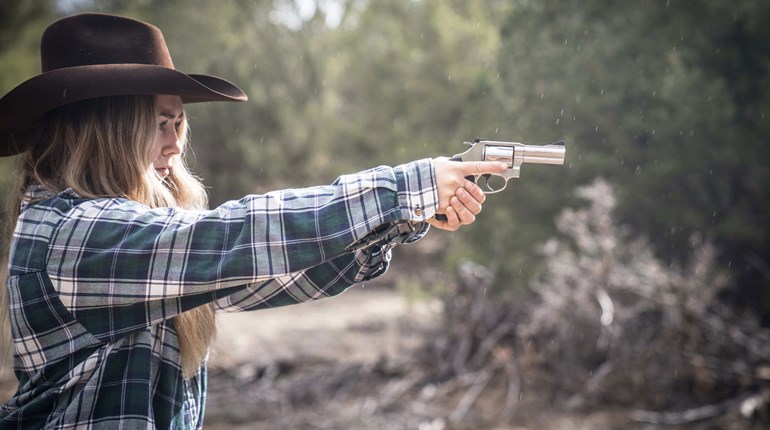
We fully support your right to defend yourself with a firearm when necessary, but if you own a gun, you need to be familiar with the laws of self-defense and use of force in your state. In other words, do you know when you’re legally justified to use deadly force against another person? Every state has different laws on this subject, and there’s one concept in particular of which you need to be aware: Duty to retreat.
In simple terms, a duty to retreat means you are required to attempt to retreat or escape from the situation if you have the ability to do so safely before you are legally justified in using deadly force. This might be actually running away and leaving the situation. It might be driving away, if you are attacked while you’re behind the wheel and you can easily step on the gas and leave. Or retreat might be as simple as closing a door between you and the attacker. If he opens or breeches the door and you are cornered, you’ve made the best attempt at withdrawing from the situation that you could.
As of this writing, 11 states have some form of duty to retreat law: Connecticut, Delaware, Hawaii, Maine, Maryland, Massachusetts, Minnesota, Nebraska, New Jersey, New York and Rhode Island.
Duty to Retreat states are essentially the legal opposite of Stand Your Ground states. Under Stand Your Ground, you are NOT legally required to attempt to withdraw from a situation before using deadly force if it is otherwise warranted. In a Stand Your Ground state, you are typically allowed to use deadly force if you reasonably believe it is necessary.
To be clear, if you are able to leave a situation without having to use force, I highly recommend you do so—withdrawing can potentially save you untold amounts of grief, trauma, legal fees and more. It can even help your legal defense later if you can prove you tried to retreat before you resorted to lethal force. But if you live in a Stand Your Ground state, the choice is yours. In a Duty to Retreat state, you must make an attempt to withdraw if it’s safe to do so. If you do not, you could face charges and you cannot claim self-defense as a legal justification for your use of force. These states emphasize de-escalation over confrontation, which sounds like a valid goal—until you realize it’s one more thing to have to think about in what might be the most stressful moment of your life.
The other problem with Duty to Retreat laws is that they’re based on reason. Who’s to say a withdraw option was “reasonably safe” to attempt? Who’s to say your attempt to retreat before you used deadly force was “reasonable?” A district attorney, a prosecutor or a jury will ultimately decide or persuade others regarding whether or not your actions were reasonable, and that’s a pretty subjective standard that can be influenced by an individual’s biases and preconceived notions. It’s very easy for a prosecutor to, with the benefit of hindsight, point out all kinds of ways you could have retreated that you didn’t notice at the time or which weren’t safe or reasonable in the moment.
In most cases, a duty to retreat only applies in public spaces. As far as I can tell (and I’m not a legal expert), none of the states with a Duty to Retreat law require you to retreat in your own home—part of the Castle Doctrine that most states have in at least some form. This often does not apply to a cohabitant of the home, and if you live in a state with this exception, you will be required to retreat in your own home if you’re attacked by your roommate or live-in partner. Some of the Duty to Retreat states extend this doctrine to your workplace, stating that you do not have to retreat from your place of work. At one point, at least one state considered your vehicle part of your “castle” and did not require you to retreat from your own occupied vehicle.
In addition, in some states, Stand Your Ground only applies in a place you have a right to be, when you are not engaged in unlawful activity, and when you are not the aggressor in the situation. If you started the fight, if you’re in the middle of committing some other unlawful activity, or if you’ve been asked to leave wherever you are and you’ve refused, Stand Your Ground will not cover you. You must retreat if it’s safely possible.
It's important to understand that while Stand Your Ground laws remove any obligation to retreat, you are still required to meet the other elements of self-defense before you’re legally justified to use deadly force:
- The attack on you was unprovoked (you didn’t start the fight)
- You faced imminent harm (you were in danger right then—not earlier or later)
- You responded with an appropriate level of force (you can’t shoot someone who gently shoves you)
- You had an objectively reasonable fear of harm (a reasonable person in your situation would have been afraid for their life).















































